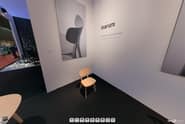
Maruni
()
Pioneering the industrial application of craft skills following establishment of the company in 1928.
From building structures such as Buddhist temples and Shinto shrines through to private dwellings and the tools that we use in our everyday lives, Japan is a nation that has for many centuries cultivated traditions based on wood that occupy an important position in our daily lives. Takeo Yamanaka, the founder of Maruni Wood Industry, spent his childhood at Miyajima in Hiroshima Prefecture, a place that has a rich heritage of traditional crafts based on the use of wood. He had always been fascinated by the mysterious properties of wood and the way in which, as a material, it is able to change shape almost at will like a conjuror’s trick. Yamanaka eventually went to university, where he specialized in mechanical engineering and became enthusiastically preoccupied with the idea of applying the theoretical foundations that he had acquired to wood as a material. He learned the German language by himself and avidly read through the technical literature on the subject originating in Europe. Upon graduating from university he formed the Yamanaka Research Institute together with five other crafts specialists. This marked the starting point for Maruni Wood Industry.
The precursor of Maruni Wood Industry was Showa Mageki Kojo (Showa Bentwood Factory). Founded in 1928, this company established the technique of bentwood working that was considered extremely difficult at the time. The name of the company was changed to Maruni Wood Industry, Inc. in 1933, after which the company set about achieving the industrial application of crafts skills in distinction to traditional Japanese methods of furniture production, which had remained until then firmly rooted in the field of the handicrafts. This was thus one of the first Japanese companies to aim at creating and mass-producing furniture on the basis of a division of labor and with recourse to methods that did not entail reliance on the manual skills of artisans.
